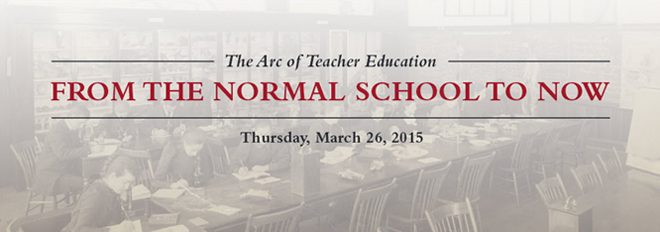Presentation Title
Session Name
Concurrent Session 5. A Little Known History and the Reclaiming of a Legacy
Start Date
26-3-2015 2:00 PM
End Date
26-3-2015 3:30 PM
Abstract
In “A Rediscovered Tradition: European Pedagogy and Composition in Nineteenth-Century Midwestern Normal Schools” Kathryn Fitzgerald argues that the Normal School tradition, though unrecognized by elite institutions, challenges dominant histories of education, offering a democratizing force for post-secondary education today. While Fitzgerald looks at institutional change and the Normal School narrative, this presentation showcases student writing that demonstrates a changed relationship among students and their home institution, former Normal Schools, and the students’ sense of intellectual power.
This presentation describes student work written in a creative nonfiction course, using the archives (dating back to 1840) of the third oldest normal school in the country, Bridgewater State University, as source material. Students who attend schools that trace their origins back to the Normal school are sometimes ambivalent about their relationship to their education and their home institution. Elite institutions define themselves and their students through a documented historical record, a legacy of excellence. Students at former Normal Schools are often without that sense of longstanding tradition.
Archival research into the history of their Normal School, helped students see themselves as scholars on a continuum of scholars, soon-to-be teachers on a continuum of teachers. Students claimed a past, a legacy, that inspired a sense of a powerful future.
Ultimately, this presentation argues that giving students access to the institutional intellectual past of the Normal school tradition in meaningful writing settings help them understand the power of composing to create change and the composition of their own scholarly power.
Included in
Finding a Future in our Past: Student Writers, a Normal School Archive, and What Happens When They Meet
In “A Rediscovered Tradition: European Pedagogy and Composition in Nineteenth-Century Midwestern Normal Schools” Kathryn Fitzgerald argues that the Normal School tradition, though unrecognized by elite institutions, challenges dominant histories of education, offering a democratizing force for post-secondary education today. While Fitzgerald looks at institutional change and the Normal School narrative, this presentation showcases student writing that demonstrates a changed relationship among students and their home institution, former Normal Schools, and the students’ sense of intellectual power.
This presentation describes student work written in a creative nonfiction course, using the archives (dating back to 1840) of the third oldest normal school in the country, Bridgewater State University, as source material. Students who attend schools that trace their origins back to the Normal school are sometimes ambivalent about their relationship to their education and their home institution. Elite institutions define themselves and their students through a documented historical record, a legacy of excellence. Students at former Normal Schools are often without that sense of longstanding tradition.
Archival research into the history of their Normal School, helped students see themselves as scholars on a continuum of scholars, soon-to-be teachers on a continuum of teachers. Students claimed a past, a legacy, that inspired a sense of a powerful future.
Ultimately, this presentation argues that giving students access to the institutional intellectual past of the Normal school tradition in meaningful writing settings help them understand the power of composing to create change and the composition of their own scholarly power.
